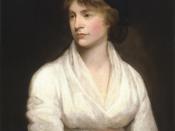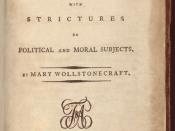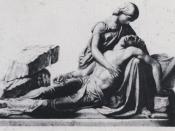One who grows up surrounded by manÃÂs infirmities will inevitably grow up to accept such failings as reality. To be nurtured and grown in such an environment yields those who love his fellow being even with their disappointments. Wollstonecraft expresses this belief in her A Vindication of the Rights of Women. Such a gradual understanding of humanity is however, not the case for many of the characters in Mary ShelleyÃÂs Frankenstein. Victor in particular, is sheltered from the reality of manÃÂs failings, whereas the monster is immediately submerged in manÃÂs atrocities. He himself is in fact a failed experiment. Thus, these two individuals have drastically different perceptions of the world based on their experiences or lack thereof with human infirmity.
In WollstonecraftÃÂs Vindication of the Rights of Women, she writes ÃÂa young man who has been bred up with domestic friends, and led to store his mind with as much speculative knowledge as can be acquired by reading and the natural reflections which youthful ebullitions of animal spirits and instinctive feelings inspire, will enter the world with warm and erroneous expectationsÃÂ (255-56), which could not better describe Victor.
He is blinded by his familyÃÂs exceeding benevolence and love to the reality of the world and human nature. Victor remarks, ÃÂNo youth could have been passed more happily than mine. My parents were indulgent, and my companions amiableÃÂ (Shelley 66), when considering his childhood. He lives in a fantasy paradise, never without the tender care of his sister, ÃÂmotherÃÂ, and friend Elizabeth or the companionship of Henry Clerval. ÃÂSuch was [his] domestic circle, from which care and pain seemed for ever banishedÃÂ (Shelley 71). Victor further conforms to WollstonecraftÃÂs description as he also describes his education as primarily that of reading and philosophical daydream and thought. The archaic studies of Cornelius Agrippa, Albertus Magnus, and Paracelsus are what occupy his daily readings and entertain his imagination. And as predicted by Wollstonecraft, ÃÂ[his] dreams were therefore undisturbed by realityÃÂ (Shelley 69) as a result of his sheltered childhood and education based around speculative knowledge. Without a clear understanding of reality or manÃÂs failures before him, Victor is free to live in a fantastical world where his imagination and daydreams dictate reality. It is his mind, which commands the limits of his potential, not truth. Raised in such an environment, free of the impossible, it is clear why Victor ventures to create life.
Raised in a similar manner, at least in education, Walton likewise has a deluded sense of reality. ÃÂInspirited by this wind of promise, my day dreams become more fervent and vivid. I try in vain to be persuaded that the pole is the seat of frost and desolation; it ever presents itself to my imaginations as the region of beauty and delightÃÂ (Shelley 49), he writes to his sister, demonstrating his unreal sense of optimism and romantic state of mind. His mind is filled with idealistic fantasies having only ÃÂread with ardourÃÂ (Shelley 50), the tales of other seafarers and their experiences. Any common sense would dictate that nothing exists at the North Pole but an icy wasteland; however, with his thoughts allowed to run free as a youth, in the glorious stories of other ventures, Walton too embarks, following only his imagination. Wollstonecraft is accurate in her conclusion of a life without ÃÂan early acquaintance with human infirmitiesÃÂ or ÃÂknowledge of the worldÃÂ (255), reflected in the perceptions of Victor and Walton.
On the polar end of Victor and WaltonÃÂs deluded views on reality, is the monsterÃÂs highly rational and analytical take on life. Born into this world as a fully formed physical being, his mind is however yet that of a childÃÂs ÃÂ completely innocent, impartial, and objective. Wollstonecraft poses the question, ÃÂIn the world few people act from principle; present feelings, and early habits, are the grand springs: but how would the former be deadened, and the latter rendered iron corroding fetters, if the world were shewn to young people just as it is; when no knowledge of mankind or their hearts, slowly obtained by experience, rendered them forbearing?ÃÂ (256). The monster is the manifestation of the answer. He acts only on his observations and to please and satisfy his sensations. He approaches civilization, awed at manÃÂs creations, and leaves in terror and fear having suffered ÃÂthe barbarity of manÃÂ (Shelley 133). His first encounter with man already reveals more truth in human nature and human infirmity than Victor has ever experienced. Consequent experiences reveal to him in full the reality of the world. He learns quickly that he will never be loved by mankind, with the warmth and affection he witnesses in the DeLacey household. Even before he realizes his own existence, he suffers one of the worse crimeÃÂs imaginable: abandonment. ÃÂExtorting alternate feelings of love and disgustÃÂ (Wollstonecraft 256), the monster has already seen man ÃÂ[appear] at one time a mere scion of evil principle, and at another as all that can be conceived of noble and godlikeÃÂ (Shelley 145). With such knowledge of manÃÂs hearts, the monsterÃÂs perception of reality resounds in stark contrast to those of Victor and Walton. He does not dwell on childish fantasies nor does he have dreams reserved to those only with the most avid imaginations. He instead commits his struggles to what is rational and should be expected. He appeals to VictorÃÂs sense of obligation to create a companion for him and also reacts sensibly after his betrayal, even seeking to end his own life when it is devoid of meaning; while, on an impulse, Victor abandons nine-months work and destroys the monsterÃÂs female counterpart. The monster acts on realistic ÃÂprinciplesÃÂ, whereas Victor acts on ÃÂpresent feelingsÃÂ and ÃÂearly habitsÃÂ of comfort (Wollstonecraft 256).
A gradual understanding of manÃÂs infirmities produces one that is likely to love his own kind, despite such knowledge whereas, a complete revelation of the fact at once confuses the mind and conflicts the soul. It seems an absurdity to a rational mind how man can accomplish so much, love so much, yet can simultaneously harbor so much evil and hate. This is how the mind who has prematurely witnessed manÃÂs infirmities understands reality. Ignorance of manÃÂs failings however may be worse, leading man to act based on caprice, although also capable of producing unbound potential.
Works CitedShelley, Mary. Frankenstein (the original 1818 text). Ed. D.L. Macdonald & Kathleen Scherf.
2d ed. Toronto, Canada: Broadview Press Ltd., 1999.
Wollstonecraft, Mary. A Vindication of the Rights of Woman in Frankenstein (the original 1818text). Shelley, Mary. Ed. D.L. Macdonald & Kathleen Scherf. 2d ed. Toronto, Canada:Broadview Press Ltd., 1999.





